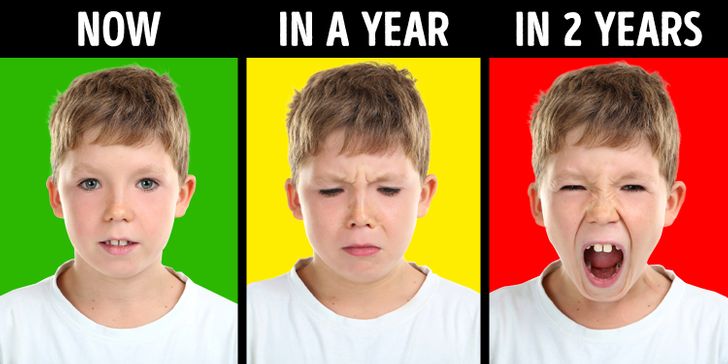I’ve known that for sometime especially with young Moms who are busy on their phone while their toddler walks behind them! Sometimes on a busy street in downtown Cleveland the Mom is totally oblivious to her child’s wellbeing! Lately I’ve noticed some mom’s giving their child a fake phone so they won’t bother her!
Why Parents Should Spend Less Time on Their Smartphones — This Is Serious
An average person in the US spends about 3 hours on a smartphone every day. Psychologists even say that families now spend more time “alone together.” This means parents are physically present but sacrifice precious time with their children for the sake of online communication. And in the end, it’s children who have to suffer the harmful consequences of such a lifestyle.
Bright Side understands that we can’t imagine our lives without smartphones but would like to remind you about the serious consequences their overuse can cause for children and their development.
1. Children may have problems with social development.
Lack of parental attention doesn’t only make children lack initiative and act moody, but it may actually damage their brain development. Researchers from the University of California found out that fragmented maternal care can have a negative influence on a child’s development and be a reason for emotional disorders.
Even minor things like texting can have a negative impact in the long run. Children need a stable and predictable environment to ensure their brain development. And a lack of maternal care can increase risks of the disruption of such development and cause psychological problems like depression, risky behavior, and substance abuse.
2. Children become angry and misbehave.
Psychologists say that parents should set boundaries on smartphone use not only for their children but for themselves as well. They reported that children feel “sad, mad, angry, and lonely” when their parents choose their phones over them. Some kids may start acting out and show mild signs of aggression, like damaging their parents’ phones to finally get the desired attention.
A lack of attention makes children feel left out and not interesting enough to be loved. It ruins their self-esteem and causes behavioral problems. It also worsens the quality of parenting and diminishes the child’s needs, causing them unnecessary stress.
3. Children don’t see their parents as good role models.
For many people, going for even a minute without checking their phones is torture. Researchers observed families at fast-food restaurants and discovered that about 70% of them used their phones during the meal. Some family members even pulled out their phones right away when they sat at the table. This way, parents deprive their children of the opportunity to engage in face-to-face interaction and learn how to behave.
Children mimic their parents’ behavior and acquire social skills through communication with them. Children learn how to have a conversation, express love, and show interest in other people. If their parents don’t serve as an example, their kids miss out on these important skills and may have problems with building an emotional connection with people later in life.
4. Children get hurt because they have to compete for their parents’ attention.

Although parents love and value their children no matter what, smartphone overuse makes children feel like they aren’t important enough and it drives them crazy because they have to compete for their parents’ attention. Children say that “checking phones during a conversation” is one of the worst parental habits. 56% even claimed that they’d confiscate their parents’ smartphones if they had a chance!
Children need attention to feel secure and confident since it contributes to their emotional development and makes it easier for them to interact with other people. When children feel that their parents love and value them, they understand their self-worth and know they deserve only the best. They know they’re already good enough and have nothing to prove.
5. Children become more passive and detached.

The emotional bond between parents and their children is strong but vulnerable. To prove that, researchers evaluated the behavior of infants aged 7 to 24 months in a situation when their mothers stopped playing with them and switched their attention to their phones instead. Their emotional response was quite surprising.
It turned out that children showed signs of distress and weren’t interested in exploring the environment around them when the mother was using her phone. And these negative consequences appeared: the longer the mother was using the phone, the more detached and disinterested the child became. Even when their mother was ready to play again, they didn’t engage in communication as much as before.
Children crave love and attention and it’s a parent’s job to give it to them. It’s okay to answer an urgent call but in most cases, it’s better to put your phone away and spend some quality time with your child. Not only will it bring joy to both of you, but it contributes to the child’s emotional development and is another important step to turn them into a happy and self-sufficient human being.
Do you limit the time you and your child spend using your phones? Maybe you have some rules you follow in your family? Share your experience in the comments.
Comments
Some people always complain that their kids sit too much on the internet and their smartphones, but actually, they spend there way more time using gandgets, watching TV and surfing the net..
Related Reads
18 Photos That Are So Powerful, They Leave a Lasting Impression on You

My Husband Insisted I Put My Gravely Ill Mom in a Nursing Home, I Made Him Taste His Own Medicine

11 Real-Life Stories That Prove Family Love Has No Limits

I Refused to Attend My Sister’s Wedding After She Excluded My Wife

12 People Whose Hobbies Defy All Expectations

12 Story Twists More Shocking Than a Hitchcock Thriller

14 People Who Have Scratched the Word "Shame" Out of Their Dictionary

I Installed a Secret Camera After My MIL Insisted on Having Our Key

10+ True Stories With Endings No One Saw Coming

10+ Crazy Real-Life Stories With More Twists and Turns Than a Movie

18 Stories About Friends Who Turned Out to Be Hidden Villains

My Ex’s Wife Uses My Daughter as a Free Babysitter—She Wasn’t Ready for My Payback




